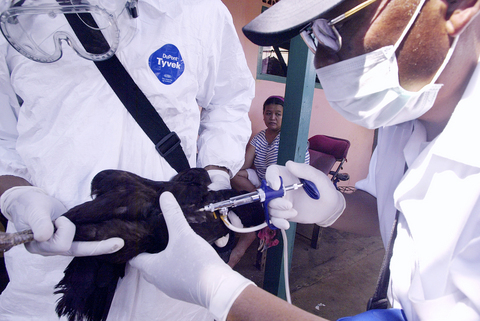An Indonesian woman has died of bird flu, raising the country's death toll to 62, while South Korea was set to slaughter 273,000 poultry after an outbreak of the deadly H5N1 strain at a chicken farm, officials said.
The 19-year-old woman died on Friday after being hospitalized for three days in the West Java town of Garut, some 200km southeast of the capital, Jakarta, said health ministry official Nyoman Kandun.
"She had contact with dead poultry six days before hospitalized," Kandun said.

PHOTO: AP
The woman's death is the fifth human bird flu fatality in the country since Jan. 9. Before that, Indonesia had not recorded any cases for six weeks -- a lull that led some Indonesian officials to say they were succeeding in beating the disease.
The spike in cases has prompted the government to plunge into an all-out campaign to clear several provinces -- with the highest number of bird flu cases -- of fowl, starting on Friday with the capital, where four people had died in the past week.
"Quick and concrete actions are needed to prevent more victims," Jakarta Governor Sutiyoso, who goes only with one name, told el-Shinta radio station yesterday.
He gave Jakarta residents two weeks to surrender or sell their birds before officials would go door-to-door confiscating fowls to rid its teeming streets of backyard chickens.
The governor also said Jakarta had plans to relocate its traditional bird markets from downtown areas, but gave no details.
There are estimated to be around 350 million backyard chickens throughout Indonesia, many of which are kept outside houses in the capital and surrounding towns.
The health minister said last week that nine other provinces hard-hit by bird flu would also soon ban chickens from residential areas.
According to the WHO, the deadly H5N1 strain of the bird flu virus has killed 161 people world wide since late 2003, and although it remains hard for humans to catch, international experts fear it may mutate into a form that could spread easily between humans.

A French-Algerian man went on trial in France on Monday for burning to death his wife in 2021, a case that shocked the public and sparked heavy criticism of police for failing to take adequate measures to protect her. Mounir Boutaa, now 48, stalked his Algerian-born wife Chahinez Daoud following their separation, and even bought a van he parked outside her house near Bordeaux in southwestern France, which he used to watch her without being detected. On May 4, 2021, he attacked her in the street, shot her in both legs, poured gasoline on her and set her on fire. A neighbor hearing

DEATH CONSTANTLY LOOMING: Decades of detention took a major toll on Iwao Hakamada’s mental health, his lawyers describing him as ‘living in a world of fantasy’ A Japanese man wrongly convicted of murder who was the world’s longest-serving death row inmate has been awarded US$1.44 million in compensation, an official said yesterday. The payout represents ¥12,500 (US$83) for each day of the more than four decades that Iwao Hakamada spent in detention, most of it on death row when each day could have been his last. It is a record for compensation of this kind, Japanese media said. The former boxer, now 89, was exonerated last year of a 1966 quadruple murder after a tireless campaign by his sister and others. The case sparked scrutiny of the justice system in

DITCH TACTICS: Kenyan officers were on their way to rescue Haitian police stuck in a ditch suspected to have been deliberately dug by Haitian gang members A Kenyan policeman deployed in Haiti has gone missing after violent gangs attacked a group of officers on a rescue mission, a UN-backed multinational security mission said in a statement yesterday. The Kenyan officers on Tuesday were on their way to rescue Haitian police stuck in a ditch “suspected to have been deliberately dug by gangs,” the statement said, adding that “specialized teams have been deployed” to search for the missing officer. Local media outlets in Haiti reported that the officer had been killed and videos of a lifeless man clothed in Kenyan uniform were shared on social media. Gang violence has left

US Vice President J.D. Vance on Friday accused Denmark of not having done enough to protect Greenland, when he visited the strategically placed and resource-rich Danish territory coveted by US President Donald Trump. Vance made his comment during a trip to the Pituffik Space Base in northwestern Greenland, a visit viewed by Copenhagen and Nuuk as a provocation. “Our message to Denmark is very simple: You have not done a good job by the people of Greenland,” Vance told a news conference. “You have under-invested in the people of Greenland, and you have under-invested in the security architecture of this